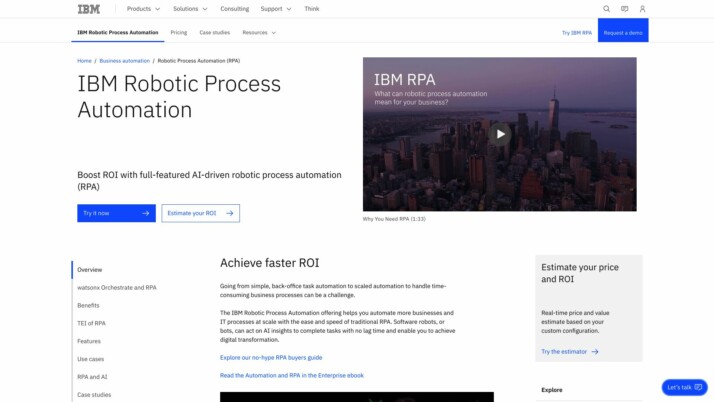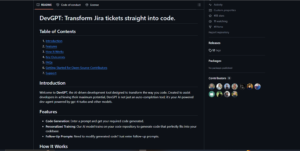IBM RPA vs. DevGPT: Comparing AI Automation Titans
AI-driven automation transforms how businesses operate, boosting efficiency and unlocking new possibilities. This comparison explores IBM RPA vs. DevGPT, and SmythOS, three powerful platforms revolutionizing task automation and software development. IBM RPA offers enterprise-grade robotic process automation, while DevGPT specializes in AI-assisted code generation for developers. SmythOS emerges as a versatile solution, combining the strengths of both to provide a comprehensive AI automation platform suitable for businesses of all sizes. We’ll examine each platform’s unique features, capabilities, and target audiences to help you determine the best fit for your organization’s automation needs.
IBM RPA Overview
IBM RPA empowers businesses to automate repetitive tasks and streamline workflows through intelligent software robots. This enterprise-grade platform combines robust process automation capabilities with AI-driven decision-making, enabling organizations to boost efficiency and reduce manual workloads.


IBM RPA offers a comprehensive suite of tools for building, deploying, and managing automated processes. Its visual bot builder allows both technical and non-technical users to create automation workflows using drag-and-drop functionality and pre-built commands. This low-code approach accelerates development and democratizes automation across the organization.
IBM RPA offers a comprehensive suite of tools for building, deploying, and managing automated processes. Its visual bot builder allows … users to create automation workflows using drag-and-drop functionality and pre-built commands.
The platform shines in its ability to integrate with existing enterprise systems and applications. Bots can interact seamlessly with mainframes, web applications, desktop software, and APIs, allowing organizations to automate end-to-end processes spanning multiple technologies. This versatility makes IBM RPA particularly well-suited for large enterprises with complex IT landscapes.
IBM RPA’s AI capabilities, powered by watsonx Orchestrate, enable bots to handle more sophisticated tasks involving unstructured data and decision-making. The platform can extract meaningful information from documents, apply intelligent routing, and even engage in natural language interactions through chatbots. This combination of RPA and AI opens up new possibilities for automation beyond simple, rule-based tasks.
IBM RPA’s AI capabilities … enable bots to handle more sophisticated tasks involving unstructured data and decision-making. The platform can extract meaningful information from documents, apply intelligent routing, and even engage in natural language interactions
While IBM RPA offers powerful features, its enterprise focus may make it less accessible for smaller organizations or individual developers. The platform’s complexity and potential learning curve could pose challenges for teams without dedicated RPA expertise. Additionally, pricing information isn’t readily available, which may complicate budgeting and ROI calculations for some potential users.
DevGPT Overview
DevGPT empowers developers to automate coding tasks through AI-assisted code generation. This open-source platform transforms natural language descriptions into executable code, streamlining the development process for individuals and small teams.


DevGPT’s key features include personalized training on a developer’s codebase, editable AI-generated outputs, and integration with popular development tools like GitHub and Jira. The platform leverages advanced language models such as GPT-4 and Codex to produce context-aware code snippets that align with individual coding styles.
Users report significant time savings, with early adopters claiming over 10 hours saved per week on repetitive coding tasks.
Users report significant time savings, with early adopters claiming over 10 hours saved per week on repetitive coding tasks. This productivity boost allows developers to focus on complex problem-solving and creative aspects of software development.
While DevGPT excels at automating routine coding tasks, it may face limitations in handling highly specialized or domain-specific programming challenges. The platform’s current focus on individuals and small teams might also present scalability concerns for larger organizations seeking enterprise-wide solutions.
DevGPT aims to become an indispensable AI coding companion, expanding its reach from individual developers to companies of all sizes. By fostering an engaged community of users and contributors, the platform seeks to drive continuous improvement and innovation in AI-assisted software development.
Feature Comparison
IBM RPA and DevGPT offer distinct approaches to automation, with IBM focusing on enterprise-grade robotic process automation and DevGPT specializing in AI-assisted code generation. IBM RPA provides a comprehensive suite of tools for building and managing automated processes across large organizations. Its visual bot builder and integration capabilities with enterprise systems make it well-suited for complex IT landscapes. DevGPT, in contrast, targets individual developers and small teams with its natural language code generation abilities.
Core component differences are evident in their AI capabilities. IBM RPA leverages watsonx Orchestrate for intelligent automation, enabling bots to handle unstructured data and make decisions. DevGPT utilizes advanced language models like GPT-4 and Codex to transform natural language descriptions into code snippets. While IBM RPA offers extensive support for enterprise applications and APIs, DevGPT focuses on integrating with development tools like GitHub and Jira.
Security features also diverge between the two platforms. IBM RPA emphasizes enterprise-grade security with robust encryption, compliance tools, and integration with IBM OpenPages for governance. DevGPT, being open-source and focused on individual developers, may not offer the same level of built-in security features, requiring users to implement their own security measures when deploying generated code.
Feature Comparison Table
| IBM RPA | DevGPT | SmythOS | |
|---|---|---|---|
| CORE FEATURES | |||
| AI Agents | ❌ | ✅ | ✅ |
| Hosted Agents (Dev, Production) | ✅ | ❌ | ✅ |
| Environments (Dev, Production) | ✅ | ❌ | ✅ |
| Visual Builder | ✅ | ❌ | ✅ |
| No-Code Options | ✅ | ❌ | ✅ |
| Memory & Context | ❌ | ✅ | ✅ |
| Autonomous Agents | ❌ | ❌ | ✅ |
| Explainability & Transparency | ❌ | ❌ | ✅ |
| Multimodal | ❌ | ❌ | ✅ |
| Problem-Solving Capabilities | ❌ | ✅ | ✅ |
| Multi-Agent Collaboration | ❌ | ❌ | ✅ |
| Audit Logs for Analytics | ✅ | ❌ | ✅ |
| Work as Team | ❌ | ✅ | ✅ |
| Bulk Work | ✅ | ❌ | ✅ |
| Agent Work Scheduler | ✅ | ❌ | ✅ |
| Logs & Monitoring | ✅ | ❌ | ✅ |
| SECURITY | |||
| Constrained Alignment | ❌ | ❌ | ✅ |
| Data Encryption | ✅ | ❌ | ✅ |
| OAuth | ❌ | ❌ | ✅ |
| IP Control | ❌ | ❌ | ✅ |
| COMPONENTS | |||
| Foundation AIs | ❌ | ❌ | ✅ |
| Huggingface AIs | ❌ | ❌ | ✅ |
| Zapier APIs | ❌ | ❌ | ✅ |
| All other APIs, RPA | ✅ | ❌ | ✅ |
| Classifiers | ❌ | ❌ | ✅ |
| Logic | ✅ | ❌ | ✅ |
| Data Lakes | ❌ | ❌ | ✅ |
| DEPLOYMENT OPTIONS (EMBODIMENTS) | |||
| Deploy as API | ✅ | ❌ | ✅ |
| Deploy as Webhook | ❌ | ❌ | ✅ |
| Staging Domains | ❌ | ❌ | ✅ |
| Production Domains | ❌ | ❌ | ✅ |
| API Authentication (OAuth + Key) | ❌ | ❌ | ✅ |
| Deploy as Site Chat | ❌ | ❌ | ✅ |
| Deploy as Scheduled Agent | ✅ | ❌ | ✅ |
| Deploy as GPT | ❌ | ❌ | ✅ |
| Scalability | ✅ | ❌ | ✅ |
| DATA LAKE SUPPORT | |||
| Hosted Vector Database | ❌ | ❌ | ✅ |
| Sitemap Crawler | ❌ | ❌ | ✅ |
| YouTube Transcript Crawler | ❌ | ❌ | ✅ |
| URL Crawler | ❌ | ❌ | ✅ |
| PDF Support | ✅ | ❌ | ✅ |
| Word File Support | ✅ | ❌ | ✅ |
Best Alternative to IBM RPA and DevGPT
SmythOS emerges as the superior alternative to IBM RPA and DevGPT, offering a comprehensive AI agent automation platform that combines ease of use with a rich feature set. Our platform empowers users to create and deploy intelligent AI agents for unlimited use cases, surpassing the limitations of traditional RPA systems and code-generation tools.
Unlike IBM RPA’s focus on automating repetitive tasks or DevGPT’s emphasis on code generation, SmythOS provides a versatile environment for building sophisticated AI agents that can handle complex, context-aware tasks across various domains. We offer a visual drag-and-drop interface that simplifies agent creation, allowing both technical and non-technical users to design powerful AI workflows without extensive coding knowledge.
SmythOS provides a versatile environment for building sophisticated AI agents that can handle complex, context-aware tasks across various domains.
SmythOS excels in its extensive integration capabilities, supporting a wide array of APIs, AI models, and external services. This flexibility enables users to connect their AI agents with existing systems seamlessly, enhancing productivity across diverse business processes. Our platform also prioritizes scalability and security, ensuring that AI solutions can grow with your organization while maintaining robust data protection and compliance standards.
One of SmythOS’s standout features is its support for multi-agent collaboration, allowing teams of AI agents to work together on complex tasks. This capability, absent in both IBM RPA and DevGPT, opens up new possibilities for tackling intricate business challenges. Additionally, our platform offers advanced deployment options, including API endpoints, webhooks, and integration with popular AI platforms, providing unparalleled flexibility in how you utilize your AI agents.
By choosing SmythOS, users gain access to a cutting-edge AI operating system that accelerates AI development and deployment by up to 99%. Our platform’s intuitive design, coupled with its powerful features, positions SmythOS as the ideal choice for businesses and individuals looking to harness the full potential of AI technology, far surpassing the capabilities offered by IBM RPA and DevGPT.
Conclusion
IBM RPA and DevGPT offer valuable automation solutions, each with unique strengths. IBM RPA excels in enterprise-grade process automation, providing robust tools for large organizations to streamline complex workflows. Its integration capabilities and AI-powered decision-making make it a powerful choice for businesses with intricate IT landscapes. DevGPT, on the other hand, shines in the realm of AI-assisted code generation, offering significant time savings for individual developers and small teams.
While both platforms have their merits, SmythOS emerges as the superior choice for businesses seeking a comprehensive AI automation solution. We combine the best of both worlds — enterprise-grade capabilities and developer-friendly features — in a single, versatile platform. Our drag-and-drop interface allows for rapid development of AI agents without extensive coding knowledge, democratizing AI creation across organizations.
Unlike IBM RPA and DevGPT, SmythOS offers unparalleled flexibility in deployment options. Our ’Create Once, Deploy Anywhere’ approach enables users to seamlessly integrate AI agents into various environments, from chatbots and APIs to scheduled tasks and GPT plugins. This versatility, coupled with our extensive integration ecosystem of over 300,000 connections, positions SmythOS as the ideal choice for businesses looking to maximize their AI potential.
We invite you to experience the transformative power of SmythOS firsthand. Create a free SmythOS account today and start building AI agents with no time limit or financial commitment. With our 30-day money-back guarantee on paid plans, you can explore our advanced features risk-free. Discover our diverse range of AI-powered agent templates to jumpstart your automation journey and revolutionize your workflow with intelligent agents. Join us in shaping the future of AI-driven productivity and innovation.
Last updated:
Disclaimer: The information presented in this article is for general informational purposes only and is provided as is. While we strive to keep the content up-to-date and accurate, we make no representations or warranties of any kind, express or implied, about the completeness, accuracy, reliability, suitability, or availability of the information contained in this article.
Any reliance you place on such information is strictly at your own risk. We reserve the right to make additions, deletions, or modifications to the contents of this article at any time without prior notice.
In no event will we be liable for any loss or damage including without limitation, indirect or consequential loss or damage, or any loss or damage whatsoever arising from loss of data, profits, or any other loss not specified herein arising out of, or in connection with, the use of this article.
Despite our best efforts, this article may contain oversights, errors, or omissions. If you notice any inaccuracies or have concerns about the content, please report them through our content feedback form. Your input helps us maintain the quality and reliability of our information.

